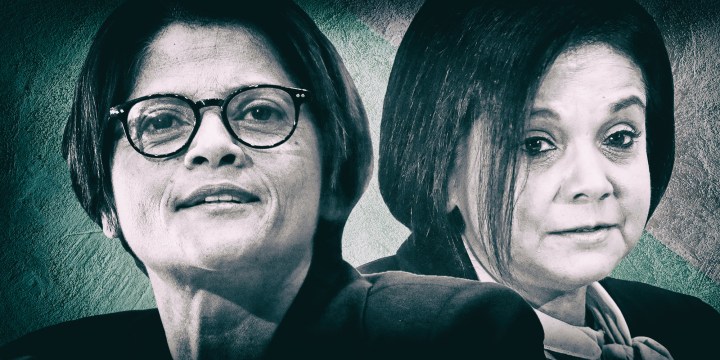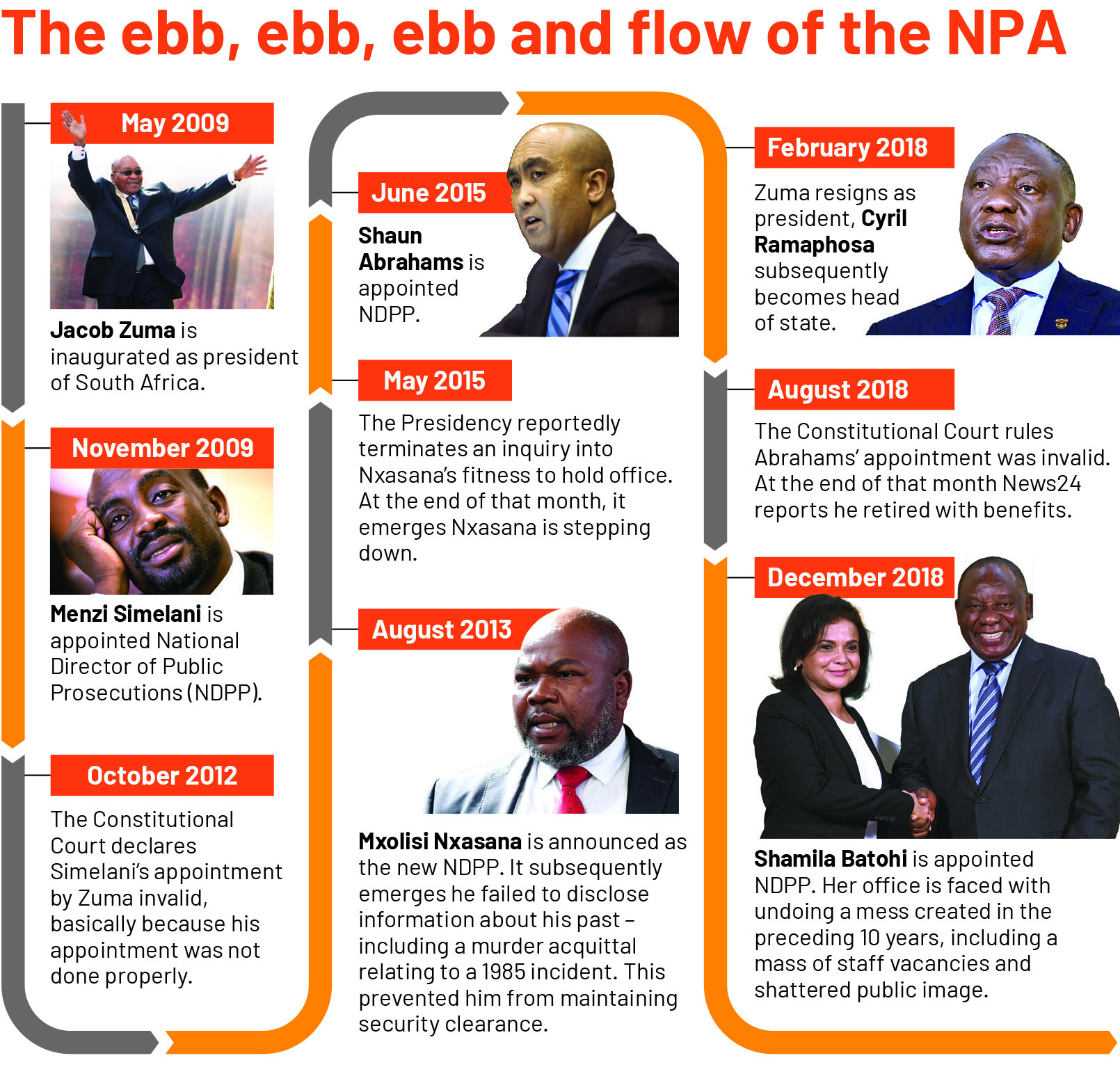DM168 ANALYSIS
Masterfully multitasking: Shamila Batohi’s National Prosecuting Authority is getting back on track

South Africa’s prosecuting powers were all but depleted over 10 years. Now, under new leadership, the National Prosecuting Authority is trying to get back up to speed and go after, among others, those who stripped the state.
First published in the Daily Maverick 168 weekly newspaper.
The National Prosecuting Authority (NPA) is masterfully multitasking – boosting staff numbers while pressing ahead with high-level corruption cases – to get back on track.
It is one of several State Capture casualties, along with the South African Revenue Service (SARS), that is trying to regain its footing following years of turmoil.
Much like SARS, with which it works closely, the decimation of the NPA took only a few years. Its weakening was swift, but its recovery is expected to take some time. It’s a process with several hurdles in its path – factors that could see those guilty of State Capture concoct new fightback strategies.
But there are definite signs of progress.
Among the reinvigorated NPA’s major successes is the December 2020 sentencing of former Crime Intelligence chief financial officer Solly Lazarus to 10 years in jail in a corruption case (which he has appealed). His conviction and sentencing were a first for the NPA’s Investigative Directorate (ID), the anti-corruption unit President Cyril Ramaphosa established in March 2019.
The NPA’s apparent turning point was just three months earlier, in December 2018, bringing to an end the tumultuous years involving three successive permanent prosecution heads who were controversially appointed under Jacob Zuma’s presidency. Shamila Batohi was appointed national director of public prosecutions (NDPP) at the NPA under Ramaphosa’s administration.
Addressing Parliament in May this year, Batohi said rebuilding the NPA was “no mean feat” but there was “light at the end of the tunnel”. The rule of law, she said, was “far from defeated”.
In the NPA’s five-year plan ending 2025, Batohi did not mince her words about State Capture. “Corruption has reached endemic proportions; revelations about ‘state capture’ implicating state officials, including in the criminal justice system, and the private sector, lay bare the gravity of the situation,” she said. “State institutions, including the National Prosecuting Authority, have been weakened; there is … a loss of trust in the NPA, and the criminal justice system as a whole.”
Batohi, though, was determined to turn this situation around.
DM168, by scrutinising the NPA’s latest annual report, five-year strategic plan, and presentations to Parliament, has established that part of its turnaround strategy involves:

- Becoming an independent entity within government, meaning that it plans to detach itself from the Department of Justice and Constitutional Development’s administrative and budget processes;
- Amending the Prevention of Organised Crime Act to boost asset recovery. This, in turn, will strengthen the activities of the Asset Forfeiture Unit (AFU) that depends on the NPA to go ahead with asset forfeiture applications. The unit has been up against obstacles, including a staff shortage.
- Expediting high-profile national and provincial corruption cases.
- Employing more staff. Justice Minister Ronald Lamola in May told Parliament that: “The NPA currently has its full top leadership team in place and it is prioritising the filling of other key senior posts in the coming months.”
- Bolstering the ID, headed by Hermione Cronje. A presentation to Parliament on the ID, which has experienced a skills and capacity shortage, addressed this issue: “Its first cohort of 21 financial investigators came on board in January 2021.” Investigators from the State Capture Commission were also expected to work with the ID once the commission is wrapped up, which is likely to be in three months’ time. DM168 understands that this move could see figures such as commission evidence leader Advocate Kate Hofmeyr working with the NPA.
This past week, ID spokesperson Sindisiwe Twala said: “The onboarding of the resources between the commission and the ID has begun, with a few investigators from the commission already hired. The main win for law enforcement is the forensic capability… The onboarding of this is still ongoing.”
The State Capture Commission regulations were amended in July 2020, allowing the commission to share information with law enforcement. This was not the case when it started its work in 2018, and there were difficulties to do with information sharing and quickly proceeding with prosecutions.
National NPA spokesperson Sipho Ngwema described the preceding decade as “the most traumatic” in its history. “Some amongst us dropped the ball during that era – we did things … at variance with the values of an independent, professional, accountable and credible prosecuting authority,” he told DM168.
“[A] critical component of the State Capture Strategy was to thoroughly incapacitate the law enforcement organs … to eliminate or immobilise any possible threat of prosecution… The institution is still healing from that unfortunate period.”
Ngwema elaborated on the moves to reduce the NPA’s vacancy rate and to increase the resources available to the agency. More than 900 appointments were made and 400 interns recruited, with another 130 earmarked for this financial year. “With all that, the vacancy rate is still above 20% – this demonstrates the depth of the challenges presented by State Capture,” Ngwema said.
There were some obstacles in the NPA’s way that were out of its control, he added. “The Covid [crisis]and fiscal challenges notwithstanding, time is not on our side. Some criminals prescribe; witnesses forget; some get sick and die – this includes investigators and prosecutors.We need to regain public and investor confidence. The best message to demonstrate that crime doesn’t pay is to arrest and prosecute those who break the law, particularly corruption because this cancer hits the vast majority the most. We must deliver soon.”
The NPA’s 2019/20 annual report referred to its capture: “Like many other state organs, the organisation became a weakened state institution.”
Around March 2018, while Shaun Abrahams was NDPP, it appeared that there were tensions between the prosecuting authority and the Directorate of Priority Crime Investigation, better known as the Hawks, with which it is supposed to work closely.
According to the minutes of a parliamentary meeting, the acting Hawks head at the time, Yolisa Matakata, said the NPA “was hindering progress in the investigation and prosecution of offences related to State Capture”.
Abrahams denied this and Matakata later said the work of the Hawks “was never hindered by the NPA”.
However, others attending this meeting in Parliament questioned Abrahams’ integrity. “There was a general perception that both Advocate Abrahams and the NPA are politically captured and lack independence,” the meeting minutes said.
The real or perceived tensions between the NPA and the Hawks seem to have dissipated in the years since Zuma left power. By last month, Parliament heard the working relationship between them was good. There have been no further allegations of political interference.
This is a change from the situation in April 2019, when an inquiry relating to the NPA found: “Over the years, the NPA has been beleaguered by allegations of malfeasance and political interference…
“This is particularly troubling, given the critical role that the NPA plays in ensuring that the rule of law, the very foundation of our constitutional democracy, is both respected and safeguarded.”
The inquiry said the NPA’s recent history showed it to be vulnerable to political interference, and recommended: “Serious measures must be taken against politicians and members of the executive and other private persons/entities who seek to influence unduly the NPA in the performance of its functions.”
When Batohi took over the leadership of the NPA, she set up an ethics committee in her office. DM168
This story first appeared in our weekly Daily Maverick 168 newspaper which is available for free to Pick n Pay Smart Shoppers at these Pick n Pay stores.





















 Become an Insider
Become an Insider
If only! After two and a half years in the position, Batohi has precious little to show in terms of convictions but I am sure she is enjoying her ride on the gravy train. If she wants some leads to follow, perhaps she should subscribe to Daily Maverick and Scorpio – it would make her life easier.
Really Beecee, did you read the article? Read it again and reconsider your response. Shamela Batohi was given a mountain to climb and she has done well in a short time. I think we can expect the recovery rate to speed up now and also the rate of prosecution of the difficult and politically charged cases.
So agree with this view. “Masterfully multitasking” is just spin IMHO. NDPP could have started with some small fry to get momentum building, the support of the public and to make the corrupt think twice… with so few actual cases in court, very few successes, doesn’t seem that the corrupt are showing the slightest concern or slowing at all…
I’ve wondered whether we could benefit from adding something like the US Grand Jury, but using a panel of 2 or 3 judges, and combined with the French investigative judge.
So when case gets to right level, the police and NPA do a mini-trial (fake) in which they present the core evidence, argument and the panel tells them either it looks sharp for actual case and authorizes data intercepts and warrants, or tells them where an a****** defense lawyer is likely to squirm out.
The panel in every way is trying to help make cases that will succeed and succeed quickly.
The Office of NDPP is still controlled by certain elements of State Capture. If you need information you can contact me.
Wow. Please let us know if they do
Am I missing something? We are celebrating a single conviction in 2020?